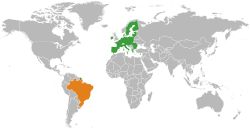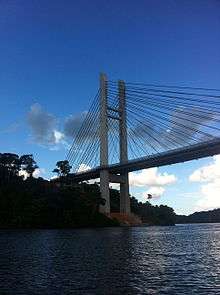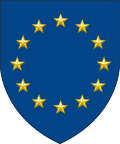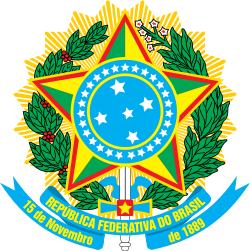Brazil–European Union relations
Brazil and the European Union established diplomatic relations in 1960.[1] The European Union and Brazil have close historical, cultural, economic and political ties.[1] At the 1st EU-Brazil summit, in 2007, Brazil entered in a strategic partnership with the European Union, strengthening their ties.[2] This new relationship places Brazil high on the EU’s political map.[1]
 | |
EU |
Brazil |
|---|---|
Agreements
The present relationship is governed by the EC-Brazil Framework Cooperation Agreement[3] (1992), EU-Mercosul Framework Cooperation Agreement[4] (1995) and the Agreement for Scientific and Technological Cooperation[5] (2004). The EU is currently seeking a free trade agreement with Mercosur, the regional trade bloc of which Brazil is a part.[6]
Trade
The EU is Brazil’s leading trade partner and represented 18.3% of Brazil’s total trade in 2017.[6] In 2007, the EU imported €32.3 billion in Brazilian goods and exported €21.2 billion in goods to Brazil.[7] Brazil's exports to the EU are mainly primary products (primarily agricultural) however a third is made up of manufactured products. The EU's exports to Brazil are mainly manufactured machinery, transport equipment and chemicals.[6] In terms of goods, Brazil has a trade surplus with the EU; however including services it has a deficit.[6] The EU is also a major investor in Brazil with investment capital amounting to €88 billion in 2006[7] making it the largest single investor in the country.[6]
| EU – Brazil trade in 2007[6] | ||||
|---|---|---|---|---|
| Direction of trade | Goods | Services | Investment flow | Investment stocks |
| EU to Brazil | €21.2 billion | €5.1 billion | €5.1 billion | €88 billion |
| Brazil to EU | €32.3 billion | €4.6 billion | €1.1 billion | €10.5 billion |
Cross-border cooperation

Brazil and the EU share a 673 km border between the state of Amapá and the French overseas department of French Guiana.[8] The cross-border cooperation between the two countries has enjoyed increased vitality. This cooperation makes it possible to better integrate French Guyana into its geographical environment, to respond to the concerns of both parties about the various cross-border risks, to encourage human exchanges and trade and to develop the economy of the Amazon region, respecting the local populations and extraordinary environment. The granting to France, on the initiative of Brazil, of observer status within the Amazon Cooperation Treaty Organization, will strengthen this cooperation. The construction of the Oyapock River Bridge over the Oyapock River, decided during President Lula’s visit to France, will make the Cayenne-Macapá road link possible.[9] The bridge was opened in 2017.
History
Since the end of the colonial period, Brazil has to this day retained a heritage of good relations with all European countries.[10] The only novel element in the idea of structuring EU-Brazil relations is therefore the EU itself, which embodies, values and wishes to further develop the systematic and ongoing organization of long-standing cooperation between the two areas.[10] Several initiatives have sought to formalize these close links at all levels, beginning with the Framework Agreement for Cooperation between the European Economic Community and Brazil in 1992.[10]
On July 4, 2007, the European Union, under Portuguese presidency, and Brazil held the 1st EU-Brazil summit.[11] The EU and Brazil exchanged views on a number of bilateral, regional and global issues.[11] They agreed to enhance their longstanding bilateral relationship and in particular to reinforce the political dialogue at the highest political level.[11] At the summit, the EU and Brazil established a comprehensive strategic partnership, based on their close historical, cultural and economic ties.[11]
In 2007, Brazil and the EU established an energy partnership.[12] The agreement aims to develop bilateral cooperation in areas of common interest, most notably in biofuels and other renewable energy sources, low-carbon energy technologies, and the improvement of energy efficiency.[12] It will also help both parties work towards increasing joint international action in the field of energy.[12]
The 2nd Brazil-European Union summit was held in Rio de Janeiro on December 22, 2008, chaired by the President of Brazil, Luiz Inácio Lula da Silva, and by the President of the Council of the European Union, Nicolas Sarkozy, the President of the European Commission, José Manuel Durão Barroso, and Javier Solana, High Representative for the Common Foreign and Security Policy.[13] The leaders discussed global issues, regional situations and the strengthening of EU-Brazil relations.[13]
On June 30, 2009, the European Economic and Social Committee and Brazilian Council for Economic and Social Development held the 1st EU-Brazil Civil Society Round Table.[14] The summit discussed the social consequences of the financial crisis as well as energy resources and climate change.[14]
Brazil's foreign relations with EU member states
|
|
|
See also
Comparison
| Population | 447,206,135[15] | 210,620,000 |
| Area | 4,232,147 km2 (1,634,041 sq mi)[16] | 8,516,000 km² (3,288,000 sq mi) |
| Population Density | 115/km² (300 /sq mi) | 24.66/km² (63.1/sq mi) |
| Capital | Brussels (de facto) | Brasília |
| Global Cities | Paris, Rome, Berlin, Warsaw, Vienna, Madrid, Amsterdam, Lisbon, Stockholm, Prague, Athens, Helsinki, Sofia, Nicosia etc. | São Paulo, Rio de Janeiro, São Luís, Fortaleza, Curitiba, São Luís, Belo Horizonte, Vitória, João Pessoa, Porto Velho. |
| Government | Supranational parliamentary democracy based on the European treaties[17] | Federal presidential constitutional republic |
| First Leader | High Authority President Jean Monnet | Emperor Pedro I |
| Current Leader | Council President Charles Michel Commission President Ursula von der Leyen |
President Jair Bolsonaro |
| Official languages | Languages of the EU | Portuguese |
| GDP (nominal) | $16.033 trillion ($35,851 per capita)[18] | US$18.569 trillion ($57,468 per capita) |
References
- External Relations:Brazil Archived May 15, 2009, at the Wayback Machine European Commission for External Relations. Retrieved on 2009-07-17.
- Joint Statement at the EU-Brazil Summit Archived July 23, 2009, at the Wayback Machine Presidency of the Council of the European Union. Retrieved on 2009-07-17.
- Framework Agreement for Cooperation between the European Economic Community and the Federative Republic of Brazil European Commission for External Relations. Retrieved on 2009-07-17.
- EU-Mercosul Framework Cooperation Agreement European Commission for External Relations. Retrieved on 2009-07-17.
- Agreement for Scientific and Technological Cooperation between the European Community and the Federative Republic of Brazil Archived May 4, 2006, at the Wayback Machine European Commission for External Relations. Retrieved on 2009-07-17.
- Bilateral relations Brazil, European Commission
- EU-Brazil Summit (Rio de Janeiro, December 22, 2008)Presidency of the Council of the European Union. Retrieved on 2009-07-17. Archived June 22, 2011, at the Wayback Machine
- "CIA - The World Factbook: France - Geography". CIA. Retrieved 2010-06-27.
- "France and Brazil - Other types of cooperation". Ministry of Foreign Affairs of France. Archived from the original on 2007-10-18. Retrieved 2008-02-18.
- Opinion of the European Economic and Social Committee on EU-Brazil relations European Economic and Social Committee. Retrieved on 2009-07-17.
- EU-Brazil Summit - Lisbon, 4 July 2007 Council of the European Union. Retrieved on 2009-07-17.
- The European Union deepens energy relations with Brazil European Union. Retrieved on 2009-07-17.
- Second Brazil-European Union Summit Joint Statement Rio de Janeiro, 22 December, 2008 Presidency of the European Commission. Retrieved on 2009-07-17.
- First EU-Brazil Round Table Nieuwsbank. Retrieved on 2009-07-17.
- "Eurostat-Tables,Graphs and Maps Interface(TGM)table". European Commission. Retrieved 9 March 2015.
- Field Listing – Area "Field Listing – Area" Check
|url=value (help). The World Factbook. Central Intelligence Agency. Retrieved 9 March 2015. - Parliamentary democracy and the Treaty of Lisbon Archived 21 January 2015 at the Wayback Machine
- "IMF EU Nominal". Retrieved 18 March 2020.
Further reading
- European Parliament recommendation to the Council of 12 March 2009 on the European Union-Brazil Strategic Partnership European Parliament
- Partnerships for effective multilateralism: EU relations with Brazil, China, India and Russia, Chaillot Paper No. 109, June 2008, European Union Institute for Security Studies
External links
- Brazilian Mission to the European Communities Official website
- Delegation of the European Union in Brazil Official website
- EU external relations: Brazil
- EUBrasil
.jpg)

